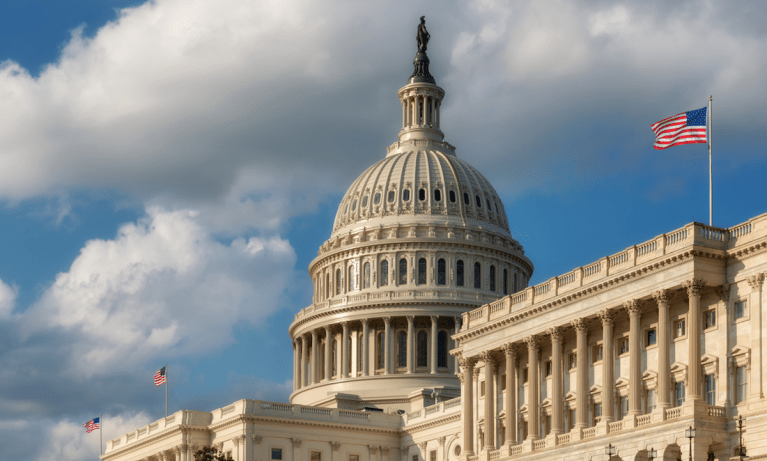But on Monday (May 19), after weeks of political back-and-forth, the Senate voted to advance the GENIUS Act, an acronym for Guiding and Establishing National Innovation for U.S. Stablecoins of 2025 Act, the country’s first stablecoin legislation.
The 66-32 vote crossed the 60-vote threshold needed to invoke cloture on a motion to proceed to the bill.
“Tonight’s vote is a welcome and long-overdue step toward asserting U.S. leadership in digital assets. After playing politics, I’m glad many of my Democratic colleagues have returned to the table and are supporting a bipartisan product they helped shape. By moving forward on the GENIUS Act, we are one step closer to delivering a regulatory framework that keeps innovation in America, protects consumers, and safeguards our national security,” Senate Banking Committee Chairman Sen. Tim Scott (R-S.C.) said in a press release.
The act would mandate that stablecoin issuers maintain reserves in liquid, safe assets, adhere to anti-money laundering protocols and prioritize investor repayment in bankruptcy scenarios. These measures aim to bolster consumer protection and financial stability in the rapidly evolving digital asset market.
As the GENIUS Act moves toward final passage, the Senate is preparing for an open amendment process, allowing for further debate and potential modifications to the bill, with the Durbin-Marshall credit card mandates alleged to be potentially included as part of the overall package. The outcome of these discussions will have far-reaching implications for the future of cryptocurrency, and payments, regulation in the United States.
A vote on the industry-backed regulatory bill could happen as soon as this week.
“[T]he Senate will make history when we debate and pass the GENIUS Act that establishes the first ever pro-growth regulatory framework for payment stablecoins,” Sen. Bill Hagerty (R-Tenn.) said in a joint statement with Sen. Kirsten Gillibrand (D-N.Y.) on Friday (May 16).
Read also: Crypto Firms Grapple With Bank-Like Risks, Without the Regulation
Political Tensions and Ethical Concerns
Even with the bipartisan support, the GENIUS Act has not been without controversy. Critics, particularly among Senate Democrats, have raised concerns about potential conflicts of interest involving President Donald Trump’s financial ties to the cryptocurrency industry, arguing that the legislation could inadvertently benefit Trump’s personal financial interests.
Senator Elizabeth Warren (D-Mass.) has been vocal in her opposition, warning that the bill could enable President Trump to financially benefit from his own cryptocurrency ventures, including the USD1 stablecoin launched by his family’s company, World Liberty Financial. As their concerns come to a head, Senate Democrats recently introduced the End Crypto Corruption Act, aiming to prohibit federal officials and their families from investing in or endorsing digital assets.
Democratic Senator Mark Warner has reportedly claimed his party’s concerns shouldn’t hinder the legislation, calling the bill “not perfect” but “far better than the status quo.”
“For the largest banks, this is probably quite good,” former assistant secretary of the treasury Amias Gerety told PYMNTS in March. “I think the largest banks will succeed as stablecoin issuers.”
As PYMNTS wrote last week, the debate around the bill comes amid “widespread recognition in Washington that stablecoins are too big to ignore.” In April, stablecoin market capitalization reached an all-time high amid strong performance across crypto sectors.
“Even if stablecoins are the preferred medium for a lot of criminal activity, creating a regulated environment where these companies can operate in conjunction with law enforcement is probably a positive,” Dan Boyle, partner at Boies Schiller Flexner, told PYMNTS in April.
See also: Keeping Stablecoins Stable is Complicated: Why CFOs Need to Pay Attention
Amendment Lurks
While the GENIUS Act is fundamentally a stablecoin and digital asset bill, it now carries a Trojan horse provision with seismic implications for the traditional payments industry: the inclusion of the Durbin-Marshall credit card routing mandates.
Interchange fees from Visa and Mastercard are a significant revenue stream for banks, especially large card issuers like JPMorgan Chase, Citibank and Capital One.
The Durbin-Marshall proposal aims to replicate what was done for debit card networks in the 2010 Dodd-Frank Act, which required multiple network options for debit transactions. Since then, costs for merchants dropped, and competition marginally increased, though critics argue that savings were not passed down to consumers.
By extending similar requirements to credit cards, Durbin-Marshall could erode the dominance of the Visa-Mastercard duopoly and open the door for emerging players — potentially including real-time payment networks, blockchain-based systems or FinTech-native rails like Stripe or Square.

